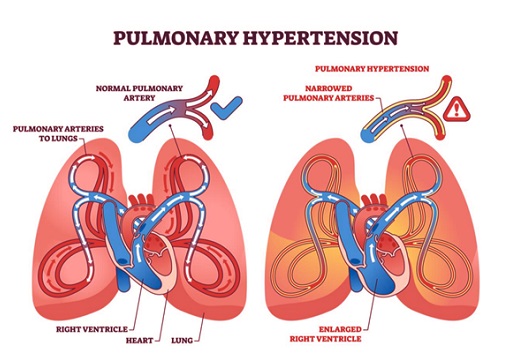Slovenian Study Finds That Higher Pulmonary Pressure Linked to Long Term Death Risk in Elderly Severe COVID-19 Patients
Nikhil Prasad Fact checked by:Thailand Medical News Team Feb 12, 2025 2 months, 1 day, 7 hours, 11 minutes ago
Medical News: New Study Identifies a Key Indicator of Survival in Elderly COVID-19 Patients
A new study has revealed that elderly patients suffering from severe COVID-19 pneumonia may face a higher long-term risk of death if they have elevated pulmonary artery pressure at the time of hospital admission. Researchers from General Hospital Celje and the University of Ljubljana in Slovenia conducted the study, focusing on critically ill patients who were admitted to intensive care units (ICUs) during the pandemic.
 Slovenian Study Finds That Higher Pulmonary Pressure Linked to Long Term Death Risk in Elderly Severe COVID-19 Patients
Understanding the Role of Pulmonary Pressure in COVID-19
Slovenian Study Finds That Higher Pulmonary Pressure Linked to Long Term Death Risk in Elderly Severe COVID-19 Patients
Understanding the Role of Pulmonary Pressure in COVID-19
The coronavirus pandemic has led to an increased understanding of how the disease affects the human body, including its impact on lung function and the circulatory system. This
Medical News report highlights that among elderly patients, an increase in systolic pulmonary artery pressure (sPAP) at the time of ICU admission is strongly linked to an increased risk of death, not just in the short term but also over the long haul.
The study analyzed data from 130 patients aged 70 years and older who were admitted to an ICU with severe COVID-19 pneumonia. Researchers measured their sPAP levels using a bedside ultrasound technique known as point-of-care ultrasound (POCUS). They then followed these patients for nearly three years to assess their survival outcomes.
Key Findings from the Study
The results of the study were striking. The researchers found that patients with an sPAP level of 35 mmHg or higher at the time of ICU admission had a significantly higher risk of death. Overall, 77% of the patients in the study did not survive over the long term. In contrast, those with lower sPAP readings had better survival rates.
More than 90% of the deaths occurred within the first 200 days after admission, highlighting the importance of early risk assessment. The study also showed that factors such as chronic kidney disease and chronic obstructive pulmonary disease (COPD) were also linked to a higher risk of death in the long term. However, when comparing different risk factors, sPAP levels remained one of the most significant indicators of survival.
Why This Matters for COVID-19 Patients
Pulmonary hypertension, or high pressure in the arteries that carry blood from the heart to the lungs, has long been associated with severe respiratory conditions. In COVID-19 patients, damage to the lungs can cause a sudden spike in pulmonary pressure, leading to a dangerous strain on the heart. This can result in long-term complications or even premature death.
The study’s findings suggest that measuring sPAP levels early on can help doctors identify which patients are at the highest risk of poor outcomes. If a patient is found to have elevated pulmonary pressure, doctors may consider additional treatment strategies to manage their condition and improve their
chances of survival.
Long-Term Impact and Future Research
In addition to tracking patient deaths, researchers also followed some of the long-term survivors to see how they fared after being discharged from the ICU. Several survivors experienced ongoing health issues, including heart problems, lung fibrosis, and a need for long-term oxygen therapy. This highlights the lasting effects that severe COVID-19 can have, even on those who survive the initial infection.
The study provides crucial insights into the long-term risks faced by critically ill elderly patients. By identifying key markers such as sPAP, medical professionals can improve treatment plans and potentially save lives in the future. However, researchers emphasize that more studies are needed to determine the best ways to manage high pulmonary pressure in COVID-19 patients and whether early interventions could reduce the risk of long-term complications.
The study findings were published in the peer-reviewed journal: Viruses.
https://www.mdpi.com/1999-4915/17/2/244
For the latest COVID-19 News, keep on logging to Thailand
Medical News.
Read Also:
https://www.thailandmedical.news/news/scientists-discover-that-combining-il-6-inhibitors-with-current-medications-is-a-better-approach-for-treating-pulmonary-hypertension
https://www.thailandmedical.news/news/chloroquine-helps-restore-blood-vessel-function-in-pulmonary-arterial-hypertension
https://www.thailandmedical.news/news/covid-19-causes-remodeling-of-the-pulmonary-vasculature
https://www.thailandmedical.news/articles/coronavirus
